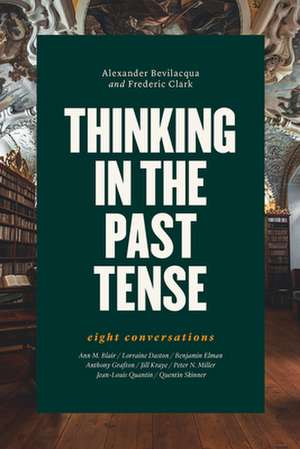Thinking in the Past Tense: Eight Conversations
Autor Alexander Bevilacqua, Frederic Clarken Limba Engleză Hardback – 16 mai 2019
If the vibrancy on display in Thinking in the Past Tense is any indication, the study of intellectual history is enjoying an unusually fertile period in both Europe and North America. This collection of conversations with leading scholars brims with insights from such diverse fields as the history of science, the reception of classical antiquity, book history, global philology, and the study of material culture. The eight practitioners interviewed here specialize in the study of the early modern period (c. 1400–1800), for the last forty years a crucial laboratory for testing new methods in intellectual history. The lively conversations don’t simply reveal these scholars’ depth and breadth of thought; they also disclose the kind of trade secrets that historians rarely elucidate in print. Thinking in the Past Tense offers students and professionals alike a rare tactile understanding of the practice of intellectual history. Here is a collectively drawn portrait of the historian’s craft today.
Preț: 480.36 lei
Preț vechi: 522.13 lei
-8% Nou
Puncte Express: 721
Preț estimativ în valută:
91.96€ • 94.57$ • 76.29£
91.96€ • 94.57$ • 76.29£
Carte disponibilă
Livrare economică 28 ianuarie-11 februarie
Livrare express 14-18 ianuarie pentru 29.68 lei
Preluare comenzi: 021 569.72.76
Specificații
ISBN-13: 9780226601175
ISBN-10: 022660117X
Pagini: 224
Dimensiuni: 152 x 229 x 18 mm
Greutate: 0.42 kg
Ediția:First Edition
Editura: University of Chicago Press
Colecția University of Chicago Press
ISBN-10: 022660117X
Pagini: 224
Dimensiuni: 152 x 229 x 18 mm
Greutate: 0.42 kg
Ediția:First Edition
Editura: University of Chicago Press
Colecția University of Chicago Press
Notă biografică
Alexander Bevilacqua is assistant professor of history at Williams College. Frederic Clark is assistant professor of classics at the University of Southern California.
Cuprins
Introduction
Ann M. Blair
Lorraine Daston
Benjamin Elman
Anthony Grafton
Jill Kraye
Peter N. Miller
Jean-Louis Quantin
Quentin Skinner
Acknowledgments
Index
Ann M. Blair
Lorraine Daston
Benjamin Elman
Anthony Grafton
Jill Kraye
Peter N. Miller
Jean-Louis Quantin
Quentin Skinner
Acknowledgments
Index
Recenzii
“In an age dominated by the sound bite and the tweet, it can be hard to resist the melancholy conclusion that the humanities are in crisis and that scholarship no longer beckons as a spiritual vocation. Thinking in the Past Tense offers reason for hope. In this intimate gallery of portraits we come face to face with eight distinguished practitioners of early modern intellectual history, and we are reminded once again of the traditional virtues of erudition and philological precision that continue to sustain this field even at a time when historical understanding seems under siege.”
“This survey of many of the best practitioners of early modern intellectual history working today is equally informative and pleasurable for scholars of all times and places. Bevilacqua and Clark take a snapshot of the state of the art in professional writing about ideas and how different lines of thought and alternative modes of practice have converged and clashed in the origins of our times. And though the study of early modern Europe has been the crucible for our debates about how to write intellectual history generally, several contributors anticipate a future in which Europe’s past is less and less central. A fascinating read.”
"At its core, this volume is about translating the experiences of eight distinguished practitioners of intellectual history into a type of textual mentorship for the next generation of intellectual historians...Thinking in the Past Tense is an approachable volume that could easily be incorporated into an intellectual history class or historical methods at the advanced undergraduate level, as well as act as a supplementary text in a graduate class for students to read alongside an author’s monograph...Thinking in the Past Tense also captures the spirit of a good academic conference. A more general academic audience would find this work useful and enjoyable."
"In this collection of conversations, leading intellectual historians in the English-speaking world provide personal insights into current issues and methodological debates within the discipline. The volume offers to newcomers important orientation to the field."
